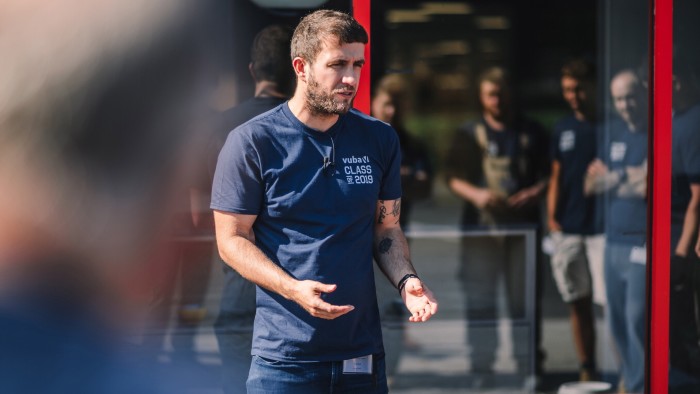Made in Europe faces mixed fortunes

Roula Khalaf, Editor of the FT, selects her favourite stories in this weekly newsletter.
Sean Scott had an internship with JPMorgan and a place at university lined up when he decided to take a gap year to work at his stepfather’s small business in East Yorkshire, installing resin floors.
“My plan was to only do it for one year and then go to university, but the market for what we were doing was growing,” Scott explains. Three years later, he had scrapped his initial plans and started his own company — not only installing flooring but also manufacturing it.
It was not easy. Scott launched Vuba in 2009, shortly after the financial crash, and says he struggled even to rent warehouse space, as no one other than his local council trusted that he would be able to pay up.
But he says that setting up a business amid an economic crisis has helped Vuba remain agile enough to grow throughout the more recent rough years.
There are only 30 manufacturing companies like Vuba in the FT’s ranking of the 1,000 fastest-growing companies in Europe this year, which pushes the sector out of the top 10.
It is a reflection of how Europe’s ability to produce goods at globally competitive prices has been hindered by recent crises — such as Covid-19 and subsequent lockdowns, higher inflation, and rising interest rates.
The continent then endured further structural hardships as soaring energy prices in the wake of Russia’s invasion of Ukraine added to already elevated production costs.
Nowhere has this been felt more acutely than in Germany, where manufacturing accounts for a fifth of the country’s overall economic output — almost double the proportion of countries such as the US, France, and the UK.
According to a closely watched annual survey by the German Chamber of Commerce and Industry, nearly a third of domestic industrial companies last year had plans to boost production outside Germany, due to growing concern over the country’s future without Russian gas.
Executives in energy-intensive industries, such as steel and chemicals, as well as politicians, have begun warning of “creeping deindustrialisation” sweeping over Europe’s largest economy.
Nils Kühle, chief executive and founder of robot supplier Fsk Industries in Gummersbach, near Cologne, says he is growing weary of talking about crises. “The biggest problem is there’s no light at the end of the tunnel — there’s nothing to be optimistic about in the whole German economy,” he says.
Fsk, which launched in 2017, specialises in so-called cobots, or collaborative robots, that work alongside humans in factories. Fsk says a rare upside is that the gloom now spreading across German industry, where there is already an acute shortage of workers, is certain to boost demand for more automation.
“I am not very optimistic for Germany [overall], but I hope there will be big possibilities in automation,” Kühle says.
His comments demonstrate the contrasting ability of companies to navigate recent economic shocks.
While Fsk had to furlough employees and halt production during lockdowns, those same periods were a boon to home improvement businesses such as Vuba: it grew significantly during the pandemic as people shifted spending from travel and leisure to renovating the homes they were stuck in.
But soaring inflation and higher interest rates have now put the brakes on consumer spending across Europe. Vuba has stepped up exports to the US, which Scott expects will make up just under a third of the roughly €28mn in sales that the company is targeting this year.
“We have had to look to other markets to continue our growth,” Scott explains — adding that he expects Vuba to keep expanding sales by 60 per cent annually for the next three to five years.
However, at superyacht maker The Italian Sea Group, chief executive Giovanni Costantino has not felt the impact of the cost of living crisis that has enveloped much of the continent. Based on the Ligurian coast, the 15-year-old company, which specialises in yachts longer than 50 metres, serves an “extremely niche customer base”, Constantino says.
This group of “ultra-high-net-worth” individuals has “only been increasing in the past few years”, he says, noting that demand from cash-wealthy buyers is growing, particularly in North and South America.
But Constantino adds that some of TISG’s suppliers — 80 per cent of which are based in Italy — are struggling to maintain enough cash on their balance sheets, which influenced the company’s recent decision to cut payment times to suppliers.
“It is no secret that it is becoming more and more difficult to outsource,” he says.
Starting a company has always been risky. Scott says his business did not really take off for the first five years, prompting him to wonder whether his decision to abandon university and an internship had been a mistake.
While he watched friends climb the corporate ladder, Scott found himself “making resin on my own in a council warehouse”.
“But you have to keep at it,” he says. “For a lot of years, it wasn’t obvious that it would work out — it was a very long overnight success story.”

Comments